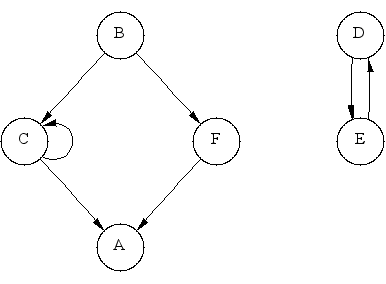auto sp = std::make_shared<T>(123, "abc"); std::weak_ptr wp{sp}; std::shared_ptr<T> sh = wp.lock(); if (sh) std::cout << sh->str;
6.3. Граф (BGL)
- boost/graph/
-
Три вида представления графа:
-
adjacency_listчаще всего используется -
adjacency_matrixприменяется, когда количество рёбер примерно соответствует квадрату количества вершин -
edge_listпредставляется из себя адаптор
-
-
adjacency_list<OutEdgeList, VertexList, Directed, VertexProperties, EdgeProperties, GraphProperties, EdgeList>-
Контейнеры для вершин и рёбер:
vecS,listS,setS, … -
Направленность графа:
directedS,undirectedS -
Различные свойства для вершин и рёбер, например, вес
boost::property<boost::edge_weight_t, int>илиboost::no_property
-
Контейнеры для вершин и рёбер:
-
Функции для работы с графом:
-
add_vertex,add_edgeдля добавления вершин и рёбер -
out_edges,in_edges,adjacent_verticesдля выяснения выходящих/входящих рёбер и соседних вершин
-

Рисунок 1. Пример направленного графа
|

Рисунок 1. Пример хранения графа в
adjacency_list |
enum vertex { A, B, C, D, E, F }; std::vector<std::pair<vertex, vertex>> edges{{ {B, C}, {B, F}, {C, A}, {C, C}, {D, E}, {E, D}, {F, A} }}; std::array weights{{2, 1, 1, 1, 3, 4, 2}}; boost::adjacency_list<boost::vecS, boost::vecS, boos::undirectedS> g{6, edges.begin(), edges.end(), weights.begin()}; auto [first, last] = boost::edges(g); std::copy(first, last, std::ostream_iterator<typename decltype(g)::edge_descriptor>(std::cout, "\n"));